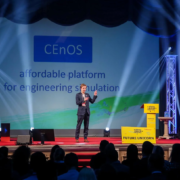CENOS raises 362’000 euros from the U.S. and European VCs and business angels for further growth
The simulation software startup CENOS LLC is continuing to grow its client portfolio of the world’s top induction heating equipment manufacturers. Furthermore, with the recently closed investment round worth 362K euros, the startup has more fuel for democratizing the simulation field and introducing new products. The plan is to go beyond induction heating and launch RF antenna design and microwave heating apps to go deeper into the electromagnetic simulation.
The startup’s investors are the famous U.S. early-stage venture fund and seed accelerator 500 Startups, European B2B startup accelerator Startup Wise Guys, angel investors from Norway and all three Baltic countries, who have been high-level engineers themselves when working in such global companies as Ford, Procter & Gamble, Gillette, and Kongsberg. The latest investment came from 500 Startups, which holds 350 million dollar investment portfolio. Many startups it invested in now have a value of more than 100 million dollars.
“Closing this 2019 investment round with such impressive angel investors and VCs shows that they see major value in the software we are developing and excellence in the team behind it. We will use this investment to continue democratizing the simulation software field, further develop our open-source algorithm-based platform, introduce new applications and grow our expertise with a passionate and dedicated team of physicists, engineers, programmers, sales and marketing people,”
said Mihails Ščepanskis, co-founder and CEO of CENOS.
The company is using the funds to enhance customer support, product development, and sales teams, by hiring new people.
CENOS is a simulation platform established by physicists and engineers. It connects the best open source algorithms into a seamless workflow. By building CENOS on open-source algorithms and tailoring it to induction heating simulation needs, the startup is setting a path to democratizing simulation software availability to SMEs as it provides two notable benefits to all engineers. First, it allows the company to lower the simulation software price without losing the quality, making it affordable to SMEs. Second, it enables building simple-to-use applications tailored specifically to manufacturer needs in specific industry sectors, avoiding the hassle of special training for engineers.
The startup launched an induction heating product in January 2019, targeting induction heating equipment manufacturers. 1 year later it’s working already with 6 of the world’s top international groups in the segment. Moreover, on the way, the company discovered that the induction heating software it has developed can serve much bigger segments – parts suppliers who use induction technology for heat treatment in automotive, aerospace, agriculture, tooling, medical, domestic suppliers and wireless chargers.
CENOS clients are companies working in automotive, aerospace and additive manufacturing. Clients are located in the USA, Mexico, Canada, Brazil, Germany, Italy and Poland. Some notable clients are SMS Elotherm, Inductotherm, EFD Induction (leading induction heating equipment manufacturers), Husky Injection Mold Systems, Netzsch (pumps producer), Protiq (additive manufacturing company, part of Phoenix Contact).
Founders also believe in the power of the academic community and that’s why free academic licenses are provided to universities and research centers. It’s already been used by top engineering universities such as TU Delft (The Netherlands), KU Leuven (Belgium), University of South Dakota (USA) and research centers – German Aerospace Center (DLR, Germany) and Shanghai Civil Aviation College (China) among others.
Furthermore, the simulation market is expected to reach $19.4 billion by 2025. Globally SMEs make 90% of all forms of entrepreneurship and this is the business area that CENOS focuses on. Taking this into consideration founders made the decision to develop new products – RF antenna design and microwave heating apps to go deeper into the electromagnetic simulation.


